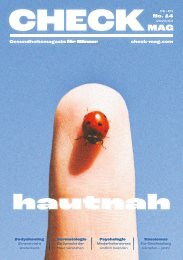CHECK Magazin - Gesundheitsmagazin für Männer No.5
Beratungs- und Anlaufstellen für Drogennutzer*innen und Abhängige sehen sich einem besonderen Dilemma ausgesetzt. Die meisten Fachkräfte aus dem Bereich der Drogenprävention wissen, dass die Ansage: „Nehmt keine Drogen, weil sie illegal und ungesund sind“, die Menschen nicht vom Konsum abhält. Die Kunst ist hier, Konsum-Strategien zu vermitteln und bei Drogenmissbrauch individuelle Schadensbegrenzung vorzunehmen, etwa in Form von Safer Use.
Beratungs- und Anlaufstellen für Drogennutzer*innen und Abhängige sehen sich einem besonderen Dilemma ausgesetzt. Die meisten Fachkräfte aus dem Bereich der Drogenprävention wissen, dass die Ansage: „Nehmt keine Drogen, weil sie illegal und ungesund sind“, die Menschen nicht vom Konsum abhält. Die Kunst ist hier, Konsum-Strategien zu vermitteln und bei Drogenmissbrauch individuelle Schadensbegrenzung vorzunehmen, etwa in Form von Safer Use.
Erfolgreiche ePaper selbst erstellen
Machen Sie aus Ihren PDF Publikationen ein blätterbares Flipbook mit unserer einzigartigen Google optimierten e-Paper Software.
SEXUAL HEALTH<br />
ENGLISH<br />
SYPHILIS<br />
THE PLEASURE PLAGUE<br />
THEN AND NOW<br />
“Syphilis“... Upon hearing the name, you quickly think of medieval cities with catastrophic<br />
sanitary conditions, cheap Victorian brothels in seedy harbor districts and wild<br />
debauched courtly merrymaking.<br />
This disease evokes a mixture of wicked horror<br />
from these pre-hygienic conditions and the<br />
secret wish to have been at such feasts. It<br />
has even been immortalized in famous works<br />
of art and literature. Once it was even said<br />
that syphilis increased libido and expanded<br />
consciousness.<br />
It was the disease of the aristocracy, the<br />
geniuses and the madmen, the artists and<br />
thinkers of bygone days, in times lacking<br />
knowledge of medical contexts and without<br />
today‘s moral concepts. A disease carried by<br />
unbridled lust.<br />
Do you see yourself stumbling into the next<br />
tavern with a mighty thirst after a long year at<br />
sea? Or stumbling down the steps with a powdered<br />
wig wrapped in brocades...? Maybe not<br />
quite, but syphilis is sure making a comeback.<br />
A SUCCESSFUL COMEBACK<br />
Syphilis is a highly contagious infectious<br />
disease transmitted by bacteria, the effects<br />
of which range from painful ulcers to organ<br />
damage and the destruction of the central<br />
nervous system.<br />
Also known as lues venerea (disaster of lust<br />
for love) or Schaudinn‘s disease, in most cases<br />
the disease is transmitted through contact<br />
with the mucous membrane during unprotected<br />
sexual intercourse. Thus, syphilis is a<br />
sexually transmitted disease (STD). A group of<br />
diseases that is currently making an unfortunately<br />
little noticed but very successful<br />
comeback. In the case of an infection, one<br />
must notify the health department, but this<br />
is registered anonymously. And there is no<br />
evidence of increased libido or consciousness.<br />
The development of powerful antibiotics, such<br />
as penicillin, was able to curb the spread of<br />
many diseases in the 20th century. Some even<br />
disappeared almost completely in the western<br />
world, such as the plague, cholera, leprosy,<br />
typhus or tuberculosis.<br />
Since the 1990s, many of them, including<br />
syphilis, have been on the rise again. And<br />
infections have even risen sharply in industrialized<br />
nations since the 2010s.<br />
According to figures from the now well-known<br />
Robert Koch Institute, the reported cases rose<br />
from 2742 in 2009 to 7889 in 2019. Quite impressive<br />
for an „extinct“ disease.<br />
Anyone who hears the name „syphilis“ should<br />
not think of the old Giacomo Casanova, but of<br />
their last sexual contacts.<br />
OVER 80% OF KNOWN INFECTIONS<br />
OCCUR IN HOMOSEXUAL MEN<br />
Treponema pallidum, the bacterium responsible<br />
for syphilis, is only transmitted from<br />
person to person and can only survive outside<br />
92 <strong>CHECK</strong> BERLIN/BRANDENBURG #5


















